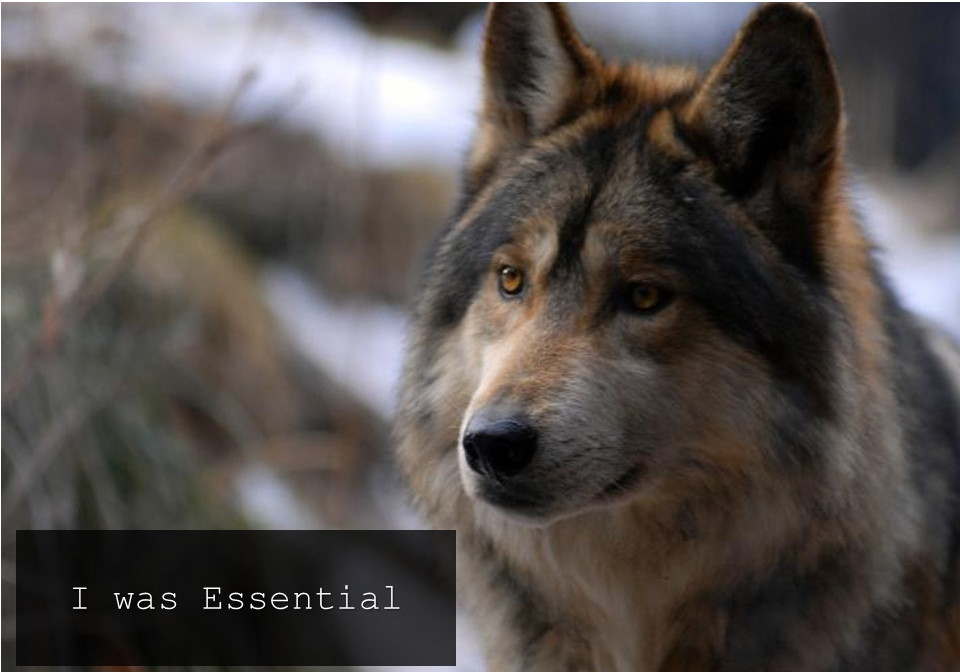In the News: Man pleads guilty in wolf shooting

Man pleads guilty in wolf shooting
By Terence Corrigan The White Mountain Independent
A Peoria man who was accused of killing a female Mexican gray wolf in December, 2017, pleaded guilty last Friday to violating the Endangered Species Act.
Jason William Kunkel was sentenced to five years of unsupervised probation, was banned from “any hunting activities” and ordered to stay out of all Arizona National Forests (except to travel through on a federal, state or local highway). Kunkel was also required to forfeit the rifle and scope used to kill the wolf. Kunkel was also ordered to pay $7,500 in restitution to the U.S. Fish and Wildlife Service.
The rifle, a Remington Model 770, sells for around $400.
On the original charges, Kunkel faced a possible sentence of up to a $50,000 fine and imprisonment of up to a year.
Also charged in the case is Donald Justin Davis from Phoenix. His next court hearing is set for December 20.
The incident occurred December 5, 2017, at an elk hunting camp near Dipping Vat Spring, northwest of the intersection of highways 273 and 261.
The incident was initially reported to an Arizona Game and Fish officer by a hunter who said he saw cellphone pictures of Kunkle posing with a dead wolf.
The informant also reported that he and other members of his hunting party had observed a wolf that “appeared to be stalking” children on the day of the killing. Another informant told investigators that he saw the wolf crouched behind a log, about 30 yards from children who were playing in Kunkel’s camp and he drove into the camp and yelled at the wolf, scaring it away.
The hunters who reported the incident told investigators that they had advised Kunkel and Davis to report the wolf killing to Arizona Game and Fish. But Kunkel and Davis chose not to report the incident and instead broke camp and left early the next morning.
On December 28, a USFWS agent went to Kunkel’s residence in Peoria and interviewed him about the wolf killing. Davis told the investigator that a wolf had come into his camp three times but he denied killing it. But when the agent asked Kunkel to see the cell phone photos of the wolf, he changed his story and admitted to the killing. He told the agent he initially lied because he was afraid of the consequences.
Kunkel told the agent, that after he killed the wolf, he and Davis decided to not report the killing “and further agreed to not talk about it with each other nor to anyone else in future,” according to the complaint prepared by the USFWS agent.
On Kunkel’s cell phone, the agent reported seeing five photos of the dead wolf, three of them with Kunkel posing with the dead animal.
Also on December 28, the agent interviewed Davis at his home in Phoenix. Davis, a self-described outdoorsman, said he was able to identify wolves and distinguish them from coyotes. Davis further reported that he did not have any safety concerns about the wolves he saw near their campsite.
Davis reported that he had used Kunkel’s cell phone to take the trophy pictures of Kunkel with the dead wolf.
During a second interview with the agent, on January 8, 2018, Davis reported that Kunkel asked if he should shoot the approaching wolf. Davis said he told Kunkel that whether or not to shoot was up to Kunkel.
After Kunkel shot the wolf, “Davis said he congratulated Kunkel by shaking his hand”¦,” according to the complaint.
- The U.S. Fish and Wildlife Service must get serious about curbing illegal killings of endangered Mexican gray wolves by increasing public acceptance of wolves, increasing penalties to dissuade wolf killers, and by accepting contemporary research on negative impacts of removing wolves who depredate.
- Last week, a man faced sentencing for the convicted killing of a rare Mexican gray wolf. There have been numerous illegal killings of the Mexican gray wolf in recent years, but this is the first conviction since 2011. When wolves are illegally killed, there must be repercussions or people will assume they’re unlikely to be caught or punished for the crime.
- The man admitted to knowing it was an endangered wolf before killing her, revealing the failure of the Arizona Game and Fish Department to educate hunters on why endangered wolves are important to healthy ecosystems and the punishments that come with unnecessary, illegal killings.
- The wolf was born in the wild and is part of the story of species resilience. Lobo f1675 is proof that recovery is possible and her killing shows us how important hunter education is to the survival of the Mexican gray wolves. When the neighboring hunters saw her just before she was killed, they called AZ Game and Fish to get information about how to respond and honored the efforts to return wolves to their rightful homes.
- We need more releases of wolf families in captivity to ensure that the loss of one lobo doesn’t impact the survival and genetic diversity of the pack.



